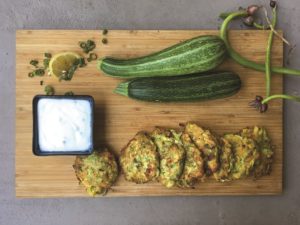I’m resigned to the Outer Cape’s annual round of plagues: mosquitos, gnats, pollen, greenhead flies, black flies, tourists, drought. With climate change at our door, can frogs or a river of blood be far behind? More burdensome to me than any of these yearly torments is the beginning of excess-garden-produce season.
This is the moment when the lettuces have bolted and the zucchini morph from adorable to menacing. And since the kitchen garden is something I imagine myself in charge of, this plague is my own personal hell.
I blame my struggle on Agnes Eva LeBeau Bouquet. My grandmother was born in rural Louisiana in the year that the Red Sox won their last 20th-century World Series — 1918. (She died in the year that they won their first 21st-century World Series — a completely random fact that I find meaningful anyway.) While her name tilts majestic, my grandmother was raised as one of eight children on a family farm where waste was almost unknown. It a kind of farm now rarely seen in America — a subsistence farm.
I continue to be amazed by her stories of how the farm economy worked — the canning of vegetables, the drying of grain, the churning of butter and farmers’ cheese, the fall boucheries at which neighbors gathered monthly to slaughter a hog and then share and preserve and make use of every scrap of that animal.
Because they could feed and clothe and house themselves, my grandmother’s family did not consider themselves poor. But life was a struggle. Old black and white photographs portray rough, plain folks, with the leanness of those who have only just enough to eat.
My grandmother was generous but frugal. She didn’t waste anything; that just didn’t occur to her. She had a kitchen drawer filled with rubber bands that she saved from her daily subscription to the New Orleans Times-Picayune — there were thousands of them, which she repurposed in the most interesting ways.
As a child, I saw her frugality as alternately puzzling, idiosyncratic, charming, and irrelevant. Now I find that latent anti-waste gene expressing itself in me. My own reluctance to waste is attached to concerns about the environment, rather than want, but my global ethics slide easily into a path well-worn by my grandmother. She believed that waste was a sin and, in my own way, so do I.
That is what makes my responsibility for the lettuces and zucchini so weighty.
First the bolting lettuces. I leaf through old some cookbooks and take a quick turn around the internet, enough to be reminded that I’m not the only one who has lettuce struggles. Back in my grandmother’s day, before industrial monoculture and international refrigerated shipping, folks cooked what was available. In the heat of summer, I learned, when the lettuce bolted, quite a few made it into soup, even fancy soup. I tried two different recipes but wasn’t sold. So, I followed instinct, and blanched, chopped, and froze the thickening leaves to use in stews and stir frys come winter. We shall see.
With the zucchini I was more successful. I remembered a recipe that my father-in-law made for us several years ago when he visited here at the cottage. After a quick family consultation, I set about turning my extra zucchini into light, savory pancakes. My father-in-law serves them with cinnamon-spiked apple sauce, the way people do latkes. But I think what goes with them best is plain yogurt, mixed with a little garlic, some sliced scallions, and a squeeze of lemon.
They’re a quick 1-2-3: The zucchini surplus is shredded and drained, squeezed of as much water as possible, mixed with a quick batter that is lightened with beaten egg whites, and pan fried. They’re great as a nosh with drinks for a casual back porch gathering of friends. Or they become a quick weeknight meal if you serve them with a surplus-tomato, surplus-cucumber salad on the side.
Pop’s Zucchini-Feta Pancakes
Makes 6 large or 12 small pancakes

5 cups shredded zucchini, 2 or 3 medium
4 large eggs, separated
½ cup flour
1 cup finely crumbled feta cheese
½ cup thinly sliced scallions
1 Tbsp. chopped mint
½ tsp. salt
Freshly ground pepper
About ½ cup canola oil for frying
Optional, for serving:
1 cup plain yogurt
1 small garlic clove, minced
1 Tbsp. sliced scallions
A squirt of fresh lemon juice
Shred the zucchini on the large holes of a box grater. Mix the shredded flesh with ½ teaspoon kosher salt and allow to drain for 30 minutes in a colander.
While the zucchini is draining, combine all remaining pancake ingredients except for the egg whites: the yolks, flour, feta, scallions, mint, and salt and pepper.
Beat the whites with a whisk or in a mixer until the peaks that form as you pull the whisk away fold over softly.
Give the zucchini a quick rinse, then squeeze out as much water as possible. You can just use your hands, but wrapping the grated zucchini in a thin dish towel and twisting yields amazing results. Mix the zucchini into the batter.
Gently fold in the whites, using the side of a spatula. Fold until the whites are just incorporated — you may still see wisps of the whites. Don’t over-fold or your batter will lose its volume and the pancakes won’t be light.
Heat the oil in a wide, heavy skillet until it shimmers — don’t let it smoke. Use a large spoon or measuring cup to drop in quarter cups of batter for small pancakes or half cup scoops for larger ones. Cook until the first side is brown, about 2 minutes, then gently turn to brown the second side for another 2 minutes.
Drain the pancakes on paper towels and serve hot with the garlicky yogurt sauce or just a squirt of lemon and some fresh black pepper. Or follow Pop’s lead and add a dollop of applesauce on the side.



